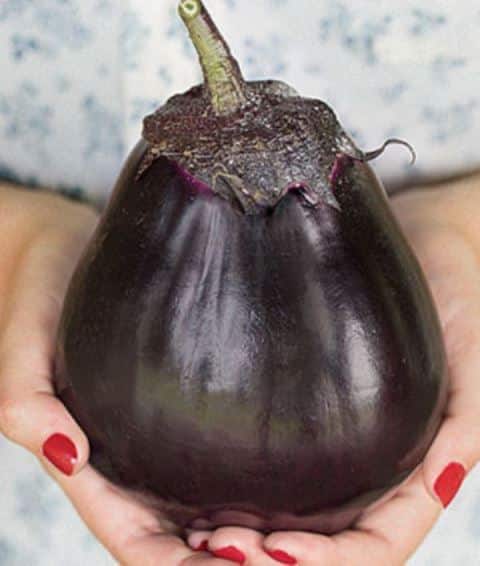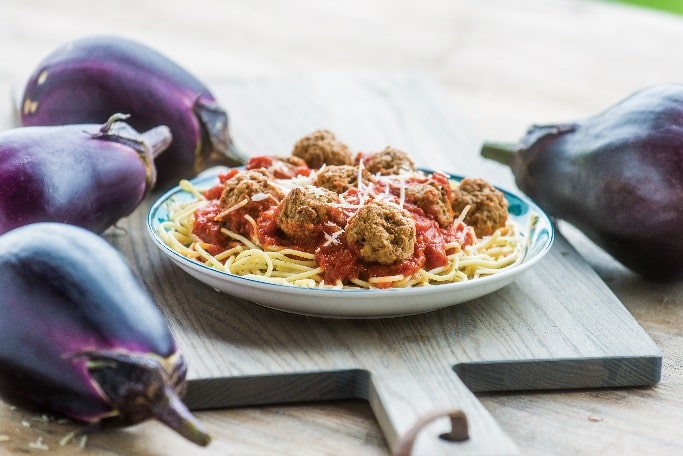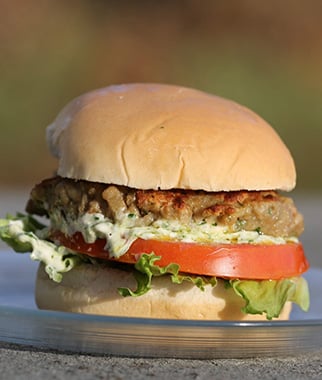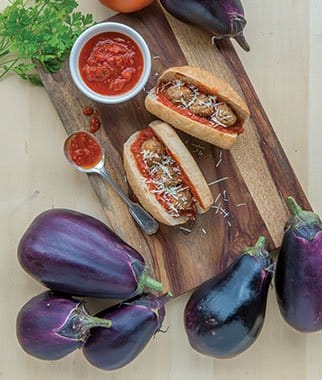Last summer, I had the opportunity to attend Burpee Fest 2015. While the fun and educational event featured touring Burpee’s historic Fordhook Farm and meeting other garden communicators, one of the absolute highlights of the trip was sampling a dish made with their all new ‘Meatball’ eggplant.
It turns out that ‘Meatball’ isn’t just an enticing name, but actually lives up to its reputation. The unique eggplant allows you to make vegetarian dishes that really do taste like real meat.
“ ‘Meatball’ is so named, because it’s a medium, globe- or ball-shaped fruit that possesses quintessentially ‘meaty’ flesh,” says George Ball, who heads Pennsylvania-based W. Atlee Burpee Company. “You can use this eggplant to prepare any dish that involves meat, as well as actual meatballs. It makes the best hamburger in the world. Not a day goes by that I don’t dream about my first eggplant ‘Meatball’ hamburger, which we have affectionately named The Burpee Burger.”
To Ball, the flavor of ‘Meatball’ is superior to real meat. “I don’t have fat filling my mouth, and there is nothing ‘dead’ about it,” he says. “In the hands of merely a good cook (nothing fancy needed) ‘Meatball’ can produce a veritable steak house platter.”

‘Meatball’ Eggplant (Burpee)
All New Eggplant
‘Meatball’ overcomes three common complaints about eggplant, which are seeds with a bitter aftertaste, excess water in the fruit and flesh that browns quickly when exposed to air. Burpee has searched for an eggplant variety without these attributes that could serve as a viable meat substitute for 20 years.
“The qualities that raise ‘Meatball’ to the highest level I have ever known of eggplants are the extraordinary succulence and creaminess of its flesh, resulting in a heavy, meaty fruit, and its sweetness, which is due to its relative seedless-ness,” says Ball, who has tested every eggplant imaginable.
‘Meatball’ was discovered in one of Burpee’s partner’s fields. “We tested it at Fordhook Farm for the past three years,” says Ball. “It’s so unlike a normal Turkish eggplant that one of our gardeners tried eating it raw and found that it has a faintly sweet taste. This is entirely different from a normal eggplant, which is not appetizing at all uncooked.”
In addition to its meaty flavor, Ball was thrilled to finally find an eggplant that would appeal to gardeners. “We’ve been trying to increase the gardening of eggplants by American vegetable gardeners for many years,” he says. “Personally, I launched ‘Purple Blush,’ as well as ‘Purple Rain’ back in the early 90s. I made a ceviche with ‘Purple Blush’ that stumped Martha Stewart. She never figured out what it was she was eating when I prepared it during her first visit to my farm. However, 25 years later, people still have a hard time preparing as well as eating eggplants in general, that the market for eggplant seeds and plants has been very small, until ‘Meatball.’”
Since its introduction this season, ‘Meatball’ has become quite popular. Burpee offers seeds for the eggplant, as well as plants. For short-season climates and first-time eggplant growers, plants are your best bet this year. You’ll have fully ripe ‘Meatball’ eggplants two months after planting transplants.

‘Meatball’ Meatballs (Burpee)
Eggplant Planting Advice
Eggplants are among the easiest of veggie plants to grow. Once you receive your plants, wait three to four days for them to acclimate to outdoor conditions. Then transplant in the ground, a raised bed or a container in a full-sun, warm location. If growing more than one eggplant, space them 24 to 36 inches apart. Provide support and encourage airflow by staking or caging the plant.
Keep eggplant watered with 1 to 2 inches of water during the growing season. Avoid overwatering. Feed with a well-balanced, organic fertilizer when flowers first appear and again when fruiting occurs.
When cooking with ‘Meatball’ eggplant, use spices, including garlic salt, and sautéed onions, advises Ball. “This variety has none of the problems of normal eggplant, so it’s not necessary to soak the flesh or extract water with salting,” he says. “This is a completely new eggplant.”
Here is Burpee’s recipe for the ‘Meatball’ burger. The website has additional recipes for using your eggplant harvest.
The Burpee Burger
Ingredients
2 large eggs
1 cup unseasoned breadcrumbs
1/2 cup loosely packed Italian parsley
1 clove garlic
2 tablespoons extra-virgin olive oil
2 medium-sized Burpee ‘Meatball’ eggplants
Salt and pepper to taste
Directions
- Mix first two ingredients in a bowl; set aside.
- Mince parsley leaves and garlic clove. Add the olive oil and combine with egg and breadcrumb mixture.
- Peel ‘Meatball’ eggplants and grate them with the largest holes of a hand grater on a paper towel to absorb excess moisture. Add the eggplant to the mixture. Last, season with salt and pepper. You will have a soft mixture. If it is too watery, add a tablespoon of all-purpose flour.
- Form the mixture into patties and cook in a heavy pan in a small amount of cooking oil. (Due to the soft texture of the mixture, you will not be able to cook this veggie burger on a grill.)
- Cook some thick slices of white onion at the same time, in the same pan.
- Serve with cooked sliced onion, fresh-sliced tomato and freshly-picked lettuce leaves.
Serves 4-5.

‘Meatball’ Burger (Burpee)
Julie Bawden-Davis is a garden writer and master gardener, who since 1985 has written for publications such as Organic Gardening, The American Gardener, Wildflower, Better Homes and Gardens and The Los Angeles Times. She is the author of seven books, including Reader’s Digest Flower Gardening, Fairy Gardening, The Strawberry Story Series, and Indoor Gardening the Organic Way, and is the founder of HealthyHouseplants.com.

